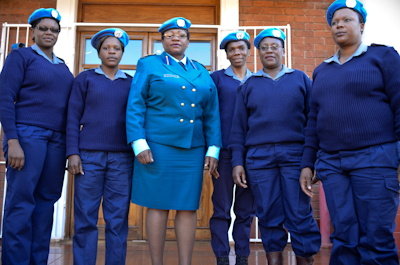Zimbabwean women police officers make inroads as members of the ‘blue berets’
Date:
For Assistant Police Commissioner Charity Charamba, who served as a peacekeeper for three years in Liberia, being the third-highest ranking official in the mission had its gender challenges.
“I had to assert myself, because at first the male colleagues, both at the senior and lower ranks, treated me as if I did not know my duties and at times, did not acknowledge my presence, she remembers.
Zimbabwe is one of the few countries in the world where the number of female peacekeepers from the police force nearly meets the United Nations Department of Peacekeeping Operations recommendation of at least 20 per cent female representation.

Of the 1,063 officers of Zimbabwe's police who have taken part in eight peacekeeping missions worldwide, a total of 189 of them (18 per cent) have been women. The first woman served in East Timor in 2000, seven years after the police began participating in peacekeeping missions.
From providing security to women and girls as they go searching for wood for cooking, to providing support during elections, to ensuring food supplies can reach refugee camps safely—the work of peacekeepers starts at dawn and ends after most other people have gone to sleep. Far away from their own friends and families, UN peacekeepers serve a critical role in maintaining peace in post-conflict countries.
Assuming senior-level positions while on mission comes naturally to Zimbabwean police women who already hold senior posts at home, explains Assistant Commissioner Charamba.
“We are provided with equal opportunities within the police and given the chance to rise and to participate at all levels. Women are heads of several of the country's provinces and the head of the training depot is female, she says, adding that Zimbabwe's Police Commissioner General promotes women's advancement within the force.
She says working internationally gives women blue berets the chance to see different types of police practice and to share experiences.
“I have been on the Zimbabwean Police Force for 31 years and I work in the Victim Friendly Unit as a gender trainer. I've always wanted to be one of the blue berets and my dream came true, says Superintendent Kani Moyo, who served for 15 months as a Gender Police Advisor and Officer in Charge of Training in Nyala with the African Union/United Nations Hybrid peacekeeping operation known as UNAMID, in Darfur, Sudan.
Superintendent Sithulisiwe Mthimkhulu, who has been on peacekeeping missions in Sudan and Liberia, recalls facing barriers because of her gender, but also because of cultural differences.
“In Darfur, Sudan, before independence, the local people looked at you as if you were different, because you are a woman in uniform. Also, being a Muslim country, the local male police officers did not take it lightly receiving orders from a woman, she recalls.
During her missions, Mthimkhulu has worked to motivate women through sports, literacy classes and other activities to become interested in all aspects of police work and she assisted them in establishing a police women's network.
Studies show that in many countries, women peacekeepers often become role models for the local women and girls, as the custodians of peace and security and the authority they can turn to.
“I learned a lot from the police officers I worked with on missions and there has been a lot of cross-cultural learning about policies and other issues, says Superintendent Jessie Banda, who served as a Communications Officer for a year in Kosovo, and as a Community Policing Officer for 15 months in Darfur. “I look at the United Nations as an organization that unites people, she says.
The four women peacekeepers interviewed by UN Women Zimbabwe say that their pre-deployment training prepared them well for their missions as it included training and mentoring of local police officers, community and gender policy, as well as how to investigate and provide counseling to rape survivors. However, they say learning more about the laws, especially gender-based violence laws, and about cultures of the countries where they are deployed would enhance their preparedness in the field.